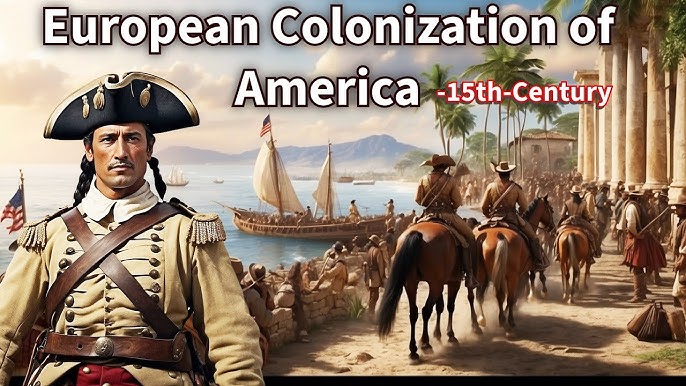European Colonization in the USA: The European colonization of what is now the United States began in the late 15th century and played a significant role in shaping the nation’s history. Various European powers, including Spain, France, and England, competed for control of North America, leading to exploration, settlement, conflicts with Native Americans, and the eventual creation of the United States.
1. The Age of Exploration (1492–1600s)
The discovery of the Americas by Christopher Columbus in 1492 triggered a wave of European exploration. Although Columbus landed in the Caribbean, his journey inspired Spain, France, the Netherlands, and England to establish colonies in North America.
Spanish Exploration and Colonization
Spain was the first European nation to establish permanent settlements in what is now the USA.
- 1513: Juan Ponce de León explored Florida while searching for the Fountain of Youth.
- 1565: Spain founded St. Augustine (Florida), the oldest European settlement in the continental USA.
- 1540s: Francisco Vásquez de Coronado explored the Southwest (Arizona, New Mexico, Texas).
Spain’s colonization focused on missionary work, converting Native Americans to Christianity, and extracting wealth from the land.
French Colonization
France focused on the fur trade and built relationships with Native American tribes.
- 1608: Samuel de Champlain founded Quebec, expanding French influence into the Great Lakes region.
- 1682: René-Robert Cavelier de La Salle claimed the Mississippi River Valley for France, naming it Louisiana.
Unlike the Spanish, the French established trading posts rather than large settlements.
Dutch Colonization – European Colonization in the USA
The Dutch founded New Netherland (New York) in 1624, focusing on trade.
- The Dutch built New Amsterdam (later New York City), which became a key port.
- In 1664, the English took control of New Netherland and renamed it New York.
English Colonization: The Birth of the Thirteen Colonies
England had the greatest long-term impact on the future USA.
- 1607: The first permanent English settlement, Jamestown, Virginia, was established.
- 1620: The Pilgrims arrived on the Mayflower, settling in Plymouth, Massachusetts, seeking religious freedom.
- 1630s: The Puritans established the Massachusetts Bay Colony, shaping American religious traditions.
England’s colonies grew rapidly, leading to the formation of the Thirteen Colonies along the East Coast.
2. The Thirteen Colonies and Colonial Life (1607–1776)
By the 1700s, the British controlled most of the East Coast, dividing the colonies into three regions:
New England Colonies (Massachusetts, Rhode Island, Connecticut, New Hampshire)
- Economy: Fishing, shipbuilding, trade
- Religion: Strong Puritan influence
- Government: Town meetings and early democratic ideas
Middle Colonies (New York, New Jersey, Pennsylvania, Delaware)
- Economy: Farming, trade, fur trading
- Religion: Diverse, including Quakers, Catholics, and Protestants
- Known as the “Breadbasket” colonies for their wheat and grain production European Colonization in the USA
Southern Colonies (Virginia, Maryland, North Carolina, South Carolina, Georgia)
- Economy: Plantations, cash crops (tobacco, cotton, rice, indigo)
- Labor: Slavery became central to the economy
- Society: Wealthy plantation owners controlled politics and society
3. Native American Conflicts and Impact
European colonization led to massive displacement of Native American tribes.
- Diseases like smallpox killed millions of Native Americans.
- Wars: Conflicts such as King Philip’s War (1675) and the Powhatan Wars resulted in significant Native American losses.
- Forced removal: Many tribes were pushed westward as European settlers expanded.European Colonization in the USA
4. Road to Independence (1750s–1776)
By the mid-1700s, tensions grew between the British government and the American colonists.European Colonization in the USA
- French and Indian War (1754–1763): Britain won control over French territories but imposed high taxes on the colonies to pay for the war.
- Taxation without representation: Acts like the Stamp Act (1765) and Tea Act (1773) angered colonists.
- Boston Tea Party (1773): A protest against British taxation policies.
In 1776, the American Revolution began, leading to the colonies’ independence from Britain.
Conclusion
European colonization had a lasting impact on the USA, shaping its language, culture, government, and economy. While it led to the growth of a powerful nation, it also caused the displacement of Native Americans and the establishment of slavery. The events of the colonial period laid the foundation for the United States as we know it today.European Colonization in the USA
Would you like a more detailed exploration of any specific event?European Colonization in the USA


 Watch
Watch
 CASUAL WEAR
CASUAL WEAR

[…] Spanish Colonization in the USA: The history of the United States is deeply intertwined with the legacy of European colonization. Among the earliest European powers to explore and colonize the Americas, Spain played a significant role in shaping the early history of what would later become the United States. From the early 15th century to the 18th century, Spain’s explorers and settlers left a lasting impact on the cultural, social, and geographical landscape of the region. […]